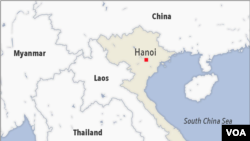An official Chinese news report saying Vietnam will resist outside interference in its relations with Beijing represents an expression of China's hope for resolving troubled relations but probably does not augur any softening of Hanoi's political stance toward China, analysts in the region said Thursday.
The state-run Xinhua News Agency said April 26 that “Vietnam opposes any forces' interference in China's internal affairs” and would “firmly resist any schemes to undermine the Vietnam-China relations.” Vietnam will never “follow other countries in opposing China,” the report added, quoting Vietnamese President Nguyen Xuan Phuc.
Phuc and Nguyen Phu Trong, general secretary of Vietnam’s Communist Party’s Central Committee, had met that day with visiting Chinese National Defense Minister Wei Fenghe in Hanoi.
The two sides, despite sharing a border and being ruled by communist parties, dispute sovereignty over parts of the South China Sea and fought a border war in the 1970s – following centuries of other territorial disputes. China still sends vessels to check Vietnamese oil exploration in the contested sea. Vietnam regularly, and vocally, protests.
Vietnam, however, counts China as a top source of raw materials for factory work and its No. 2 export market. When disputes come up, their ruling parties often meet first, privately, to smooth things over before any government officials step in.
Vietnam now as before wants to save ideological and economic ties with China while applying pressure politically, said Stephen Nagy, senior associate professor of politics and international studies at International Christian University in Tokyo.
China may have worded the English-language Xinhua statement to show the world that it still has friends despite naysayers in multiple countries, Nagy told VOA.
“It’s definitely a meeting on steroids rather than reflective of the underlying current in Vietnam-China relations,” Nagy said of the April 26 encounter.
The Vietnam News Agency, which is Xinhua’s counterpart in Hanoi, does not mention "interference" or "opposing China" in its report on the meeting. The Vietnamese agency quotes Phuc saying the two countries should not let "hostile forces" sabotage Vietnam-China relations.
Those forces could refer to people from within China or Vietnam rather than foreign countries, said Alexander Vuving, a professor at the Daniel K. Inouye Asia-Pacific Center for Security Studies in Hawaii.
As China expands its navy, Vietnam has welcomed military support from the United States as well as Western allies such as Japan. Washington sent warships to the sea 10 times each in 2019 and 2020, moves widely seen as warnings against further Chinese military expansion.
Those countries resent Chinese military expansion, especially in the South China Sea where six governments lay competing claims and accuse Beijing of violating international law to seek control of about 90% of the resource-rich waterway.
Trong, the Vietnamese party committee general secretary, called on both countries to “maintain and promote their traditional friendship, and advance the relationship between the two militaries of the two countries,” Xinhua reported from the meeting last month. Both sides have expressed these ideas before.
“No change in the policy,” Vuving said. “Their policy is basically they know their best weapon is international law and their best friends are in the U.S. and Japan.”
Vietnam and China will “cooperate” but remain “competitors” as long as their maritime sovereignty dispute continues and the United States remains a force in the region, said Wang Wei-chieh, Taiwan-based Asia political analyst and co-founder of the FBC2E International Affairs Facebook page.
“I think that they have to cooperate, but they also have to compete considering the South China Sea and also considering their geographic location – that makes them also competitors,” Wang said.




